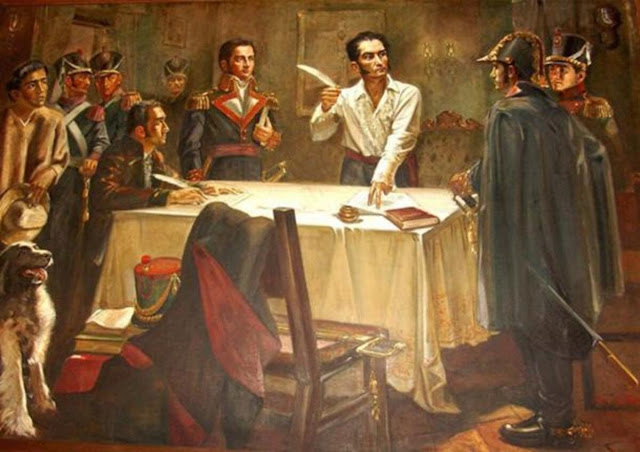Simon Bolivar (1783 – 1830) Venezuelan independence activist in South America.
Simon Bolivar Biography
Simon Bolivar is one of the most iconic figures in Latin American history. He is revered as the liberator of several countries from Spanish colonial rule. Born on July 24, 1783, in Caracas, Venezuela, Bolivar went on to become a military leader, statesman, and visionary who dedicated his life to achieving independence for his homeland and the entire continent.
Early Life:
Bolivar was born into a wealthy family in Caracas, Venezuela, but he experienced great personal tragedy at a young age. At the age of nine, he lost both his parents to disease, leaving him an orphan. He was raised by his maternal uncle, Don Carlos Palacios, who played a significant role in shaping Bolivar's political views. Bolivar received an excellent education, studying under some of the best teachers of his time. He was fluent in several languages and well-versed in literature, philosophy, and politics. It was during his travels to Europe that Bolivar became acquainted with the ideas of the Enlightenment and the American and French Revolutions, which deeply influenced his thinking.
The Fight for Independence:
Bolivar's first attempt at revolution came in 1810 when he joined the movement to overthrow Spanish rule in Venezuela. However, the rebellion was quickly suppressed, and Bolivar was forced to flee to neighboring Colombia. In 1813, Bolivar launched a new campaign to liberate Venezuela, which culminated in the Battle of Carabobo, where he achieved a decisive victory over the Spanish forces. Bolivar then turned his attention to other parts of South America, leading campaigns in Colombia, Ecuador, Peru, and Bolivia. He formed alliances with local leaders and armies, gradually building a coalition of forces that could take on the Spanish empire. Bolivar's military strategies were innovative, and he was known for his ability to motivate his troops and rally them to victory.
The Legacy of Simon Bolivar:
Bolivar's vision was not limited to military conquest. He dreamed of a united South America, free from the yoke of colonialism and dominated by democratic institutions. He believed in the ideals of freedom, equality, and justice and saw himself as a champion of the people. Bolivar was not without his flaws, and his legacy is a subject of debate among historians and politicians. Some criticize his authoritarian tendencies, while others point to his commitment to social justice and the advancement of the working class.
Conclusion:
Simon Bolivar's impact on Latin America cannot be overstated. He led the movement for independence that transformed the continent, freeing millions from colonialism and laying the foundations for democratic governance. His legacy continues to inspire people across the world, and his story is a testament to the power of vision, courage, and perseverance in the face of great adversity.









No comments